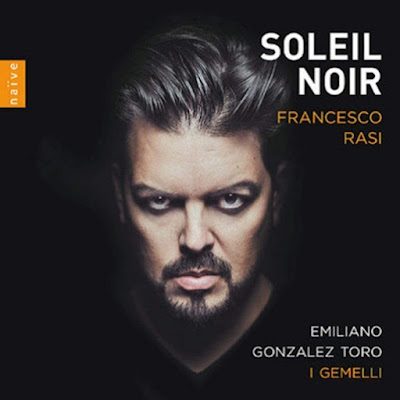Soleil Noir: arie per Francesco Rasi; Emiliano Gonzalez Toro, Louise Pierrard, Thomas Dunford, Flora Papadopoulos
Reviewed by Robert Hugill on 7 September 2021 Star rating: (★★★★★)
A spectacular and engaging voyage around the tenor Francesco Rasi who not only created the title role in Monteverdi's L'Orfeo but was associated with a number of other early opera composers
The tenor Francesco Rasi (1574-1621) is best known for creating the title role in Monteverdi's L'Orfeo in 1607, and we know the sort of feats of which he was capable as the ornamented version of Orfeo, notated alongside Monteverdi's plainer original, is Rasi's. But Rasi was a lot else besides, a composer, a noted interpreter of music by other composers associated with the development of opera, Rasi was also prosecuted for murder and attempted murder!
On this disc the ensemble I Gemelli - tenor Emiliano Gonzalez Toro, Louise Pierrard (viola da gamba), Thomas Dunford (theorbo), and Flora Papadopoulos (harp) - perform Rasi's music alongside his contemporaries, Giulio Caccini, Marco da Gagliano, Giuseppino del Biado, Sigismondo d'India, Andrea Falconieri, Carlo Gesualdo, Claudio Monteverdi, and Jacopo Peri. There is nothing from Monteverdi's L'Orfeo, you will have to turn to Gonzalez Toro's recent recording of the work for that, instead we have a voyage round Rasi's art and voice, with music by composers with whom he was intimately associated.
Born in Arezzo, Rasi seems to have studied with Giulio Caccini as well as Jacopo Peri, both of whom would be involved in the creation of the first operas. In the 1590s, Rasi seems to have been in Gesualdo's retinue but by 1598 he was working for the Gonzaga dukes of Mantua, and stayed with them for the rest of his life. He travelled widely, and took place in the first performances of Jacopo Peri's Euridice and Giulio Caccini's Il rapimento di Cefalo in 1600, and in 1608 sang in the first performances of Marco da Gagliano's La Dafne. In Florence, Rasi would meet a wide variety of musicians, in contact with the wide circle of composers, musicians, writers and philosophers that went into the boiling cauldron that created opera, monody and much else besides.
In 1610 he and some accomplices attempted to kill Rasi's stepmother and killed her servant in the process. He was sentenced for the murder but the support of the Gonzagas seems to have enabled the sentence to be annulled.
His opera Cibele, ed Ati does not survive, but he wrote both poetry and music, a good deal of monody which survives in the anthologies Vaghezze di musica (1608) and Madrigali (1610). Almost all of these are written for tenor voice, suggesting that they were written to display Rasi's own skill as a singer, and they follow in the style of Caccini's compositions.
We have two Caccini works on the disc, a poetic account of Amarilli and the more dance oriented Dalla porta 'doriente, as well as the spectacular Lamento d'apollo from Gagliano's La Dafne. Jacopo Peri's Un di soletto is another of the delightful dance-oriented numbers, demonstrating that life wasn't all poetic lamenting. Though many of Rasi's solos are just that, partly perhaps because this style gave him the chance to insert some spectacular ornamentation, so that his Ardo, ma non ardisco does indeed make us think of Monteverdi. Sigismondo d'India is represented by his intimately poetic Amico, hai vinto, and Monteverdi by the engaging Quel sguardo sdgenosetto, one of those lovely pieces over an ever repeating rhythmic foundation. After Rasi's highly poetic O pura, o chiara stella, Andrea Falconieri's E vivere e morire brings things to a more dance-oriented and delightful close.
There are a few instrumental moments as punctuation, an improvisation by Thomas Dunford, a work by Andrea Falconieri for viola and harp which certainly lives up to its name, La suave melodia, and a Gagliarda for solo harp by Gesualdo.
The texts of the items have also been carefully chosen, perhaps reflecting Rasi's interest in poetry, so that in addition to Torquato Tasso (set by Sigismondo d'India) there is a lot of poetry by Gabriello Chiabrera, author of influential mannerist poetics, as well as Ottavio Rinuccini, librettist of Peri's La Dafne, and the composer Barbara Strozzi's father.
Emiliano Gonzalez Toro is a pleasure to listen to in this repertoire, with appealingly sweet and plangent tones, superb sense of line and attention to the text, allied to a simply spectacular technique which allows him to dazzle with ornaments which become part of the musical argument rather than an end in themselves. He is finely supported by the three instrumentalists so that this is very much an intimate chamber concert. Some of the music has been adapted by the performers for these forces, reinforcing the idea of Rasi perhaps sitting down with friends in some aristocratic chamber.
This is a lovely recital which manages to bring a great deal of light and shade to the programme, yes there are intense laments but there is also joy and delightful dance-based music, creating a wonderful balance.
Soleil noir - music by Francesco Rasi, Giuseppino del Biado, Marco da Gagliano, Giulio Caccini, Jacopo Peri, Andrea Falconieri, Carlo Gesualdo, Sigismondo d'India, Claudio Monteverdi
I Gemelli:
- Emilo Conzalez Toro (tenor)
- Louise Pierrard (viola da gamba)
- Thomas Dunford (theorbo)
- Flor Papadopoulos (harp)
- Mathilde Etienne (conception)
NAIVE V5473 1CD [51.45]












I was reading some of your content on this website and I conceive this internet site is really informative ! Keep on putting up. Mondlampe
ReplyDelete